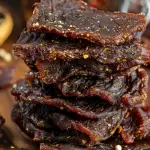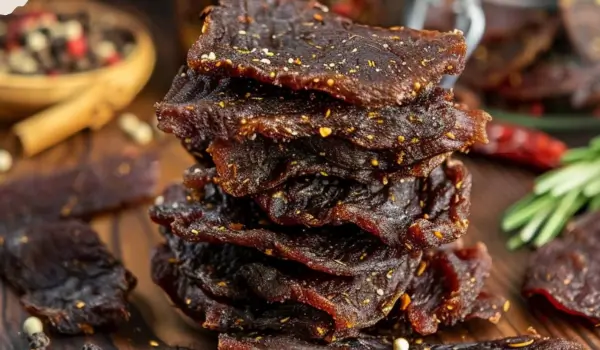Introduction
There’s something incredibly satisfying about snacking on a piece of homemade beef jerky. Not only is it a delicious and protein-packed treat, but making it at home allows you to tailor the flavors to your liking and ensures a healthier option free from preservatives and unnecessary additives. The ultimate homemade beef jerky recipe I’m sharing today is simple to follow and results in a snack that’s perfect for any occasion, whether you’re heading out on a hike, looking for a quick energy boost, or simply craving a savory treat.
By using lean cuts of beef and a flavorful marinade, you can achieve a jerky that’s both tender and full of rich, smoky taste. The process involves slicing the beef, marinating it to infuse the flavors, and then drying it to perfection. This method ensures that each bite is packed with flavor and has the perfect texture. Whether you’re new to making jerky or a seasoned pro, this recipe will guide you through each step to create the ultimate homemade beef jerky. So, roll up your sleeves and get ready to enjoy a snack that’s as fun to make as it is to eat!
Ingredients
Creating the ultimate homemade beef jerky requires a few key ingredients to achieve that perfect balance of flavor and texture. Here’s what you’ll need:
- 2 pounds lean beef: Opt for cuts like Top round, London broil, or similar, as they have less fat and make for better jerky.
- 1/2 cup soy sauce: Adds a rich, savory base to the marinade.
- 2 tablespoons Worcestershire sauce: Enhances the umami flavor.
- 2 tablespoons liquid smoke: Gives the jerky a smoky taste, mimicking the flavor of traditional smoked jerky.
- 2 tablespoons brown sugar: Provides a subtle sweetness to balance the salty and smoky flavors.
- 2 teaspoons salt: Essential for seasoning and preserving the jerky.
- 1 teaspoon ground black pepper: Adds a mild heat and depth.
- 1 teaspoon garlic powder: Infuses the meat with a robust garlic flavor.
- 1 teaspoon onion powder: Complements the garlic with a subtle onion taste.
- 1/2 teaspoon red pepper flakes: Adjust to taste for a bit of heat.
- 1/4 teaspoon curing salt (optional): Helps with preservation and gives the jerky a classic cured flavor.
These ingredients combine to create a flavorful marinade that will transform your lean beef into delicious, homemade jerky. The balance of salty, sweet, and smoky flavors ensures that each bite is packed with taste. Adjust the spices to suit your preference, whether you like it spicy, sweet, or somewhere in between.
Preparing the Beef
Partially Freezing the Beef: To make slicing easier, partially freeze the beef for about 1-2 hours. This firms up the meat, allowing you to achieve thin, uniform slices.
Slicing the Beef: Aim for slices about 1/8 to 1/4 inch thick. For more tender jerky, slice against the grain; for chewier jerky, slice with the grain. Using a sharp knife or a meat slicer can help ensure even slices, which dry more uniformly.
Making the Marinade
Combining Ingredients: In a mixing bowl, combine soy sauce, Worcestershire sauce, liquid smoke, brown sugar, salt, ground black pepper, garlic powder, onion powder, red pepper flakes, and curing salt if using. Mix well until all the sugar and salts are dissolved, ensuring a consistent marinade.
Flavor Adjustments: Adjust the amount of red pepper flakes based on your heat preference. For a sweeter jerky, increase the brown sugar slightly. You can also experiment with additional spices like smoked paprika or cayenne pepper to customize the flavor.
Marinating the Beef
Coating the Beef: Place the beef slices in a large resealable plastic bag. Pour the marinade over the beef, ensuring all slices are well-coated. Massage the bag gently to distribute the marinade evenly over all pieces.
Marination Time: Remove as much air as possible from the bag, seal, and marinate in the refrigerator for at least 4 hours, preferably overnight for deeper flavor. The longer the beef marinates, the more pronounced the flavors will be.
Drying the Beef
Preheating the Oven: Preheat your oven to the lowest setting, usually around 175°F (80°C). If you have a dehydrator, set it to 160°F (71°C).
Preparing the Beef for Drying: Remove the beef from the marinade and pat dry with paper towels to remove excess moisture. This step is crucial for achieving the desired jerky texture and preventing it from becoming too salty.
Arranging the Beef: Place the beef slices in a single layer on a baking rack over a baking sheet (to catch drips) or on the dehydrator trays. Make sure the slices aren’t touching or overlapping to allow for even drying.
Dehydrating the Beef
Oven Method: Bake the beef slices for 3-4 hours, or until the jerky is dry but still pliable. Flip the slices halfway through the drying time to ensure even dehydration.
Dehydrator Method: Follow the manufacturer’s instructions, usually drying for about 4-6 hours. Check the jerky periodically for doneness, ensuring it is dry but not brittle.
Cooling and Storing the Jerky
Cooling the Jerky: Let the jerky cool completely before storing. This helps prevent moisture buildup, which can lead to spoilage.
Storing the Jerky: Keep the jerky in an airtight container. It can be stored at room temperature for about 2 weeks, in the refrigerator for a few months, or frozen for longer storage. Proper storage ensures the jerky remains safe to eat and retains its flavor.
FAQs
How do I ensure my beef jerky is safe to eat? Ensuring your beef jerky is safe involves marinating the meat thoroughly and drying it at the correct temperature. Using curing salt can also help inhibit bacterial growth.
Can I use other types of meat for this recipe? Yes, you can use other types of meat such as turkey, pork, or even venison. Adjust the marinating and drying times accordingly.
How do I know when my jerky is done? The jerky is done when it is dry and firm but still slightly pliable. It should not be brittle or overly moist.
Can I make beef jerky without a dehydrator? Absolutely! An oven set to a low temperature works perfectly fine for making beef jerky.
Is it necessary to use liquid smoke in the marinade? Liquid smoke adds a great smoky flavor, but it is not essential. You can omit it if you prefer or substitute it with smoked paprika for a different flavor profile.
How long can I store homemade beef jerky? Homemade beef jerky can be stored at room temperature for about 2 weeks, in the refrigerator for a few months, or frozen for up to 6 months.
Conclusion
Making Your Own Beef Jerky: A Fun and Rewarding Process
Creating beef jerky at home is more than just a culinary task; it’s a delightful and satisfying experience. Moreover, the process allows you to take control of the ingredients, ensuring that your jerky is free from unnecessary additives and preservatives. Additionally, it gives you the freedom to experiment with flavors and textures to match your personal preferences. Here’s why making homemade beef jerky is a rewarding endeavor:
Control Over Ingredients
When you make beef jerky at home, you have complete control over what goes into your snack. Consequently, you can choose high-quality, lean cuts of beef and avoid artificial preservatives found in many store-bought versions. This ensures a healthier, more natural product that you can feel good about eating.
Customizing Flavors
One of the greatest advantages of making your own beef jerky is the ability to customize the flavors. Whether you prefer a spicy kick, a sweet undertone, or a smoky essence, you can adjust the marinade to suit your taste. Furthermore, you can experiment with different spices, herbs, and sauces to create a variety of flavors that keep your taste buds excited.
Cost-Effective Snacking
Homemade beef jerky can be more cost-effective than purchasing pre-packaged versions. By buying beef in bulk and using pantry staples for the marinade, you can create a delicious snack at a fraction of the cost. Additionally, you’ll end up with a larger quantity of jerky to enjoy.
Perfect for Any Occasion
Beef jerky is a versatile snack that fits well with any occasion. It’s perfect for on-the-go snacking, whether you’re heading to work, going for a hike, or traveling. It’s also a great addition to lunchboxes, providing a protein-packed option that keeps you energized throughout the day.
Storage and Shelf Life
Homemade beef jerky, when stored properly, has a long shelf life. Keep it in an airtight container at room temperature for up to two weeks, refrigerate for several months, or freeze for longer storage. Thus, this makes it an excellent snack to have on hand for unexpected cravings or last-minute road trips.
Health Benefits
Beef jerky is a high-protein, low-fat snack that can fit into various dietary plans. It’s a good source of essential nutrients like iron and zinc, making it not only tasty but also beneficial for your health. By controlling the ingredients, you can also manage the sodium levels, ensuring it fits into your nutritional goals.
Final Thoughts
Enjoying Your Homemade Beef Jerky
Making your own beef jerky at home is a rewarding process that offers numerous benefits. From controlling the ingredients and customizing the flavors to enjoying a cost-effective and versatile snack, homemade beef jerky is a treat you can enjoy any time. Use this ultimate homemade beef jerky recipe as a foundation, and feel free to adjust the seasoning and techniques to perfect your creation. Ultimately, you will enjoy your delicious, protein-packed snack that’s perfect for any occasion!
Print
10 Easy Steps to Make the Best Homemade Beef Jerky
- Total Time: Up to 18 hours (including marinating time)
- Yield: 6 servings 1x
- Diet: Gluten Free
Description
Homemade beef jerky is a delicious and protein-packed snack that’s easy to make. By using lean cuts of beef and a flavorful marinade, you can create jerky that’s both tender and full of rich, smoky taste. Perfect for a quick energy boost or a savory treat on-the-go.
Ingredients
- 2 pounds lean beef (Top round, London broil, or similar cuts)
- 1/2 cup soy sauce
- 2 tablespoons Worcestershire sauce
- 2 tablespoons liquid smoke
- 2 tablespoons brown sugar
- 2 teaspoons salt
- 1 teaspoon ground black pepper
- 1 teaspoon garlic powder
- 1 teaspoon onion powder
- 1/2 teaspoon red pepper flakes (adjust to taste)
- 1/4 teaspoon curing salt (optional)
Instructions
- Prepare the Beef: Partially freeze the beef for 1-2 hours. Slice it into thin strips about 1/8 to 1/4 inch thick.
- Make the Marinade: Combine soy sauce, Worcestershire sauce, liquid smoke, brown sugar, salt, black pepper, garlic powder, onion powder, red pepper flakes, and curing salt in a bowl.
- Marinate the Beef: Place the beef slices in a resealable plastic bag and pour the marinade over them. Seal the bag, remove excess air, and refrigerate for at least 4 hours, preferably overnight.
- Dry the Beef: Preheat oven to the lowest setting (175°F) or set a dehydrator to 160°F. Remove beef from marinade, pat dry, and arrange in a single layer on a baking rack over a baking sheet or on dehydrator trays.
- Dehydrate the Beef:
- Oven: Bake for 3-4 hours, flipping halfway through.
- Dehydrator: Follow manufacturer’s instructions, typically 4-6 hours.
- Cool and Store: Let jerky cool completely before storing in an airtight container. Store at room temperature for 2 weeks, in the refrigerator for a few months, or freeze for longer storage.
Notes
- Adjust red pepper flakes based on your heat preference.
- Use curing salt for better preservation and a classic cured flavor.
- Experiment with additional spices like smoked paprika or cayenne pepper for varied flavors.
- Prep Time: 20 minutes
- Cook Time: 3-6 hours
- Category: Snack
- Method: Dehydrating
- Cuisine: American
Nutrition
- Calories: 150 kcal
- Sugar: 5 g
- Fat: 3 g
- Carbohydrates: 6 g
- Protein: 25 g
